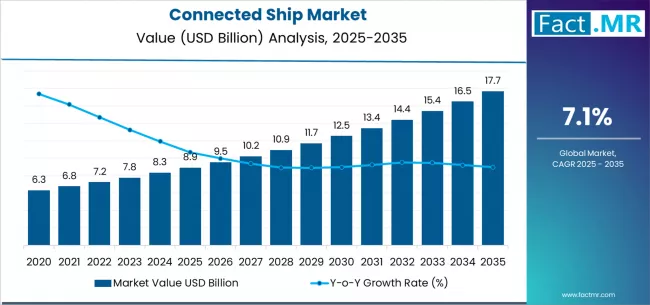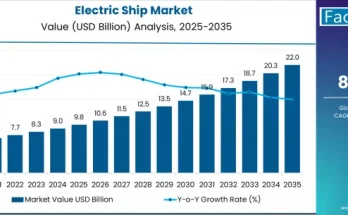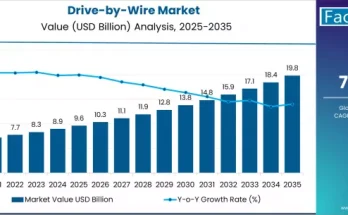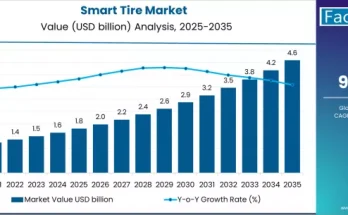The connected ship market is emerging as a critical pillar of the maritime industry’s digital transformation. As global fleets adopt advanced communication networks, real-time monitoring tools, and cloud-enabled platforms, connected ship technologies are reshaping how vessels operate, navigate, and manage onboard systems. This shift is driven by the need to enhance operational efficiency, improve safety, and optimize fleet management through intelligent, data-driven decision-making.
Market Overview:
Connected ships integrate digital technologies—such as IoT sensors, satellite communication, automation systems, cybersecurity frameworks, and analytics—to create a unified maritime ecosystem. These vessels leverage continuous data exchanges between ship and shore to enable proactive maintenance, fuel optimization, route planning, and risk mitigation.
The connected ship concept covers solutions for navigation, fleet health diagnostics, propulsion efficiency, cargo monitoring, and onboard machinery performance. By linking these systems, ship owners gain comprehensive visibility into vessel conditions and operational parameters, enabling smarter maritime operations and reducing downtime.
The market is expanding rapidly as shipping companies modernize their fleets, shipyards incorporate digital components into new builds, and regulatory bodies encourage safer and more efficient maritime practices.
Regional Insights:
North America
North America is at the forefront of adopting digital maritime technologies, supported by strong investment in IoT systems, advanced naval platforms, and widespread deployment of satellite-based communication. The region benefits from well-established technological infrastructure and an early shift toward smart fleet management solutions.
Europe
Europe remains a key market as regulatory emphasis on maritime safety, emissions reduction, and vessel tracking continues to grow. Leading shipbuilders and technology companies are collaborating to integrate autonomous navigation tools, cybersecurity systems, and real-time analytics that enhance sea-borne efficiency.
Asia-Pacific
Asia-Pacific is rapidly emerging as a major hub for the connected ship market. With expanding commercial fleets, growing naval modernization initiatives, and the rise of large-scale shipbuilding industries, the region is actively adopting digital technologies to enhance port operations and vessel performance.
Key Trends & Forecast:
- Rising Demand for Smart Navigation Solutions
Modern vessels rely on advanced GPS, radar integration, digital charts, and real-time weather analytics. These systems help optimize routes, reduce fuel consumption, and improve voyage safety—making them essential components of connected ship ecosystems.
- Expansion of IoT and Sensor Integration
Ships are increasingly equipped with hundreds of IoT sensors that monitor machinery, detect faults, and relay performance metrics to onshore command centers. This promotes predictive maintenance and reduces vessel downtime.
- Growth of Cloud-Enabled Maritime Platforms
Cloud-based technologies are allowing shipping companies to unify their fleet operations, analyze voyage data, and coordinate logistics using centralized dashboards. This enhances fleet coordination and regulatory compliance.
- Rising Focus on Cybersecurity Solutions
As vessels transition from standalone systems to interconnected networks, cybersecurity becomes extremely critical. This has driven the adoption of intrusion detection systems, encrypted communication networks, and security orchestration platforms.
- Collaboration Between Defense, Commercial, and Technology Sectors
Partnerships between naval forces, commercial fleet operators, shipyards, and technology companies are accelerating the integration of digital capabilities into both new and existing vessels.
Applications & End-Use Outlook:
Commercial Shipping
Commercial vessels are adopting connected technologies to improve cargo visibility, voyage planning, and engine monitoring. Real-time diagnostics help reduce operational costs and improve delivery timelines.
Naval & Defense
Naval vessels utilize connected systems for surveillance, threat detection, tactical communication, and system automation. Enhanced situational awareness strengthens mission readiness and maritime security.
Offshore & Marine Engineering
Offshore support vessels benefit from connected technologies that monitor heavy machinery, ensure structural integrity, and streamline drilling and exploration activities.
Passenger Ships & Ferries
Passenger vessels deploy connected systems for safety management, onboard connectivity, HVAC control, and smart entertainment solutions—improving the overall travel experience.
Technological Landscape:
Navigation & Communication Systems
Integrated navigation displays, satellite communication, 5G maritime networks, and real-time traffic management tools form the backbone of connected ship architecture.
Condition-Based Monitoring
Advanced condition-based monitoring solutions help detect anomalies in engines, fuel systems, generators, and propulsion systems, allowing timely interventions.
Automation & Control Systems
Automation technologies support autonomous sailing capabilities, engine control, ballast management, and digital bridge operations.
Cybersecurity Frameworks
With increasing digitalization, cybersecurity tools safeguard vessels from digital threats, unauthorized access, and operational disruptions.
Industry Outlook & Future Opportunities:
The future of the connected ship market is defined by automation, smart fleet management, and deeper integration of AI and machine learning. Autonomous and semi-autonomous ships are expected to enter the commercial landscape, powered by robust digital ecosystems.
Key opportunities include:
- Expanded use of digital twins for vessel simulation
- Integration of AI-driven predictive analytics
- Enhanced satellite connectivity and 5G maritime expansion
- Growth of fully autonomous navigation systems
- Increased emphasis on green shipping and emission-controlled operations
As global fleets modernize and maritime digitalization accelerates, connected ships will play a critical role in shaping a safer, smarter, and more sustainable shipping industry.
Conclusion:
The connected ship market is transforming the maritime world by enabling real-time data sharing, intelligent decision-making, and advanced operational control. As shipping companies, defense organizations, and shipyards continue investing in digital capabilities, connected ships will redefine how vessels navigate, communicate, and operate. Embracing these technologies is essential for ensuring safety, efficiency, and competitiveness in the future maritime landscape.
Browse Full Report – https://www.factmr.com/report/connected-ship-market



